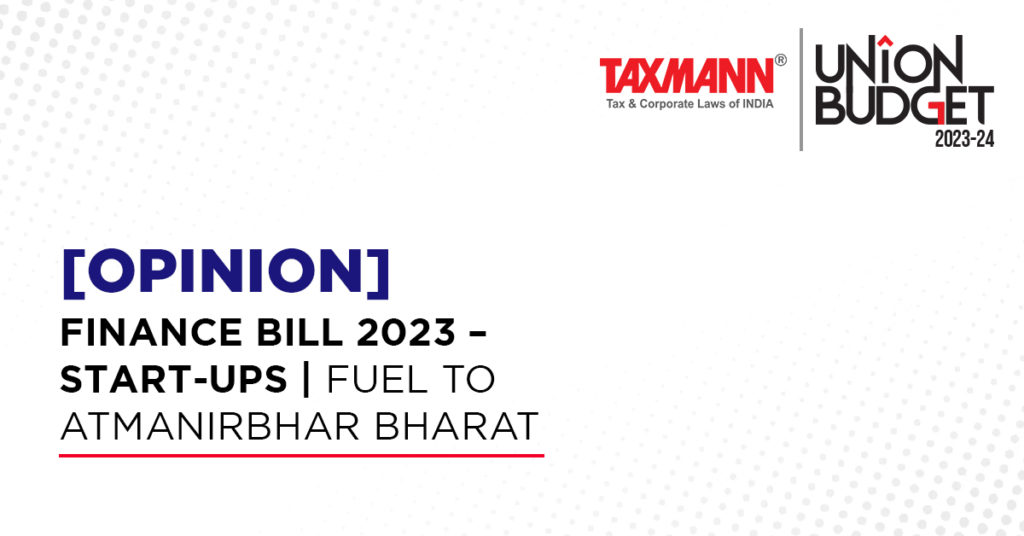[Opinion] Finance Bill 2023 – Start-ups | Fuel to Atmanirbhar Bharat
- Blog|Budget|Finance Act|
- 3 Min Read
- By Taxmann
- |
- Last Updated on 21 March, 2023

Authored by Maneesh Bawa – Executive Director & Mayank Khaneja – Senior Associate | Nangia Andersen India
Now that India has become the hub of ‘start-up’ ecosystem, ranking third in the world, the government has endeavored to keep the spirit high and taken further steps to nurture the start-ups in the Union Budget 2023. The Government intends to make start-ups the backbone of New India. In order to achieve this, time and again, the government has been favoring start-ups and offering them tax incentives. The budget 2023 offers no less as the government has further extended the period of incorporation of eligible start-ups to 1st April 2024, calling for more home-grown innovation ideas and moving a step further towards the motto ‘Atmanirbhar Bharat’.
Another relief extended to the start-ups enables them to carry forward & set-off the losses for a longer period, even if the general rule criteria is not met. The general rule latches the condition of continuity of 51% shareholding i.e., no change in personality of a company for setoff of previous years’ losses. However, this general rule was tweaked for the start-ups to allow carry forward and set-off of losses with a condition that body-of-shareholders continue to exist i.e., all the shareholders, who existed at the time when losses were incurred, continue to exist at the time of set-off of such losses irrespective of the change in personality.
Another condition imposed was that the loss is allowed to be set off, only if it has been incurred during the period of seven years beginning from the year in which the start-up was incorporated. This period has been extended to ten years in order to harmonize it with the full 10-year tax-holiday window as provided for the eligible start-ups.
It is important to note that the benefit of carry forward and set-off of losses for start-ups with respect to change in shareholding is an exception to the general provisions and would not be applicable with respect to losses incurred beyond the 10-year tax-holiday period.
Discretional ability to claim consecutive 3-year 100% tax-holiday within a timeframe of 10 years from date-of-incorporation and qualifying criteria of having annual business-turnover not exceeding INR 100 crores and necessary certification has been left unchanged.
Separately, with respect to amendment made to the Angel Tax provisions, eligible Start-ups registered with DPIIT remain unaffected on deeming taxability of share premiums received from non-resident investor(s) in excess of Fair Market Valuation (‘FMV’) at the time of issue-of-shares, subject to fulfillment of prescribed conditions.
As also acknowledged in her budget speech by the Hon’ble Finance Minister, Entrepreneurship remains vital for a country’s economic development. In a bid to boost the start-ups, these amendments have been brought in. Apart from the Income-tax benefits, a lot of benefits including policy changes, a larger budget allocation for start-ups and measures under the other laws/policies have been proposed.
Start-up Industry perceives the changes as a welcome move as the extension of carry forward of losses from 7 years to 10 years will benefit a large chunk of the start-ups. Further, the extension by 1 year invites more start-ups to contribute towards the economy creating a win-win situation for both the entrepreneurs and the government.
Disclaimer: The content/information published on the website is only for general information of the user and shall not be construed as legal advice. While the Taxmann has exercised reasonable efforts to ensure the veracity of information/content published, Taxmann shall be under no liability in any manner whatsoever for incorrect information, if any.

Taxmann Publications has a dedicated in-house Research & Editorial Team. This team consists of a team of Chartered Accountants, Company Secretaries, and Lawyers. This team works under the guidance and supervision of editor-in-chief Mr Rakesh Bhargava.
The Research and Editorial Team is responsible for developing reliable and accurate content for the readers. The team follows the six-sigma approach to achieve the benchmark of zero error in its publications and research platforms. The team ensures that the following publication guidelines are thoroughly followed while developing the content:
- The statutory material is obtained only from the authorized and reliable sources
- All the latest developments in the judicial and legislative fields are covered
- Prepare the analytical write-ups on current, controversial, and important issues to help the readers to understand the concept and its implications
- Every content published by Taxmann is complete, accurate and lucid
- All evidence-based statements are supported with proper reference to Section, Circular No., Notification No. or citations
- The golden rules of grammar, style and consistency are thoroughly followed
- Font and size that’s easy to read and remain consistent across all imprint and digital publications are applied

![The Budget [Income-tax | GST | Customs] | 2023-24](https://www.taxmann.com/post/wp-content/uploads/2022/02/Budget-copy-2023_blog_9789356226692.jpg)


 CA | CS | CMA
CA | CS | CMA
